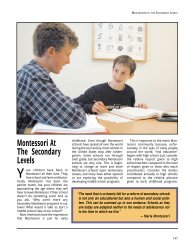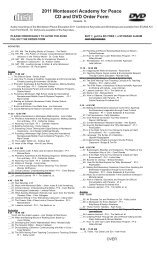Tim Seldin & Paul Epstein Ph.D. An Education for Life
Tim Seldin & Paul Epstein Ph.D. An Education for Life
Tim Seldin & Paul Epstein Ph.D. An Education for Life
You also want an ePaper? Increase the reach of your titles
YUMPU automatically turns print PDFs into web optimized ePapers that Google loves.
<strong>An</strong>y given testing session can be profoundly<br />
affected by the student’s emotional<br />
state, attitude, and health,<br />
and to a large degree, what they<br />
really demonstrate is how well a<br />
student knows how to take this kind<br />
of test. Montessori educators further<br />
argue that <strong>for</strong>mal tests are unnecessary,<br />
since any good teacher who<br />
works with the same children <strong>for</strong> three<br />
years and carefully observes their<br />
work, knows far more about students’<br />
progress than any paper-and-pencil<br />
test can reveal.<br />
The ultimate problem with standardized<br />
tests in our country is that<br />
they have often been misunderstood<br />
and misinterpreted in other<br />
schools. Tests can be fairly useful when<br />
seen as a simple feedback loop, giving<br />
both parents and school a<br />
general sense of how students are<br />
progressing.<br />
Although standardized tests may not<br />
offer a terribly accurate measure of a<br />
child’s basic skills and knowledge, in<br />
our culture, test-taking skills are just<br />
another Practical <strong>Life</strong> lesson that children<br />
need to master.<br />
Reporting Student Progress<br />
Because Montessori believes in individually<br />
paced academic progress<br />
and encourages children to explore<br />
their interests rather than simply<br />
complete work assigned by their<br />
teachers, we don’t assign grades or<br />
rank students within each class<br />
according to their achievement.<br />
Parents, students, and guides give<br />
and receive feedback in several different<br />
ways:<br />
Student Self-Evaluations: At the<br />
elementary level, students will<br />
often prepare a monthly selfevaluation<br />
of their previous<br />
month’s work. When completed,<br />
they meet with the teachers, who<br />
will review it and add their comments<br />
and observations. Students<br />
also prepare self-evaluations of<br />
the past three month’s work: what<br />
they accomplished, what they<br />
enjoyed the most, what they<br />
found most difficult, and what<br />
they would like to learn in the<br />
three months ahead.<br />
MONTESSORI FOR THE ELEMENTARY YEARS<br />
Portfolios of Student Work:<br />
In many Montessori schools,<br />
two or three times a year,<br />
teachers (and at the elementary<br />
level, students) and sometimes<br />
parents go through the students’<br />
completed work and<br />
make selections <strong>for</strong> their portfolios.<br />
Student/Parent/Teacher<br />
Conferences: Once the students’<br />
three-month self evaluations<br />
are complete, parents, students,<br />
and teachers will hold a<br />
family conference two or three<br />
times a year to review their<br />
children’s portfolios and selfevaluations<br />
and go through the<br />
teachers’ assessment of their<br />
children’s progress.<br />
Narrative Progress Reports:<br />
Typically once or twice a year<br />
Montessori teachers will prepare<br />
a written narrative evaluation of<br />
the student’s work, social development,<br />
and mastery of fundamental<br />
skills.<br />
Some final thoughts in closing ...<br />
We invite you to take a close look at the kind of person your child has become today at four or five and<br />
ask yourself how would you like her to be when she’s eighteen? By what set of values do you hope she<br />
will live? Do you hope that she will still love school and be excited about learning? If so, then you have laid the right<br />
foundation by sending her to Montessori thus far. Like our families and so many millions of others like us, you’ve<br />
taken the first step. <strong>An</strong>d now the question is what’s next? We invite you to follow those of us who have gone be<strong>for</strong>e<br />
down the Montessori path. We have discovered it to be the best decision that we could have made <strong>for</strong> our children.<br />
What your son or daughter has experienced thus far is just the first step in the journey, and the best is yet to come.<br />
145




